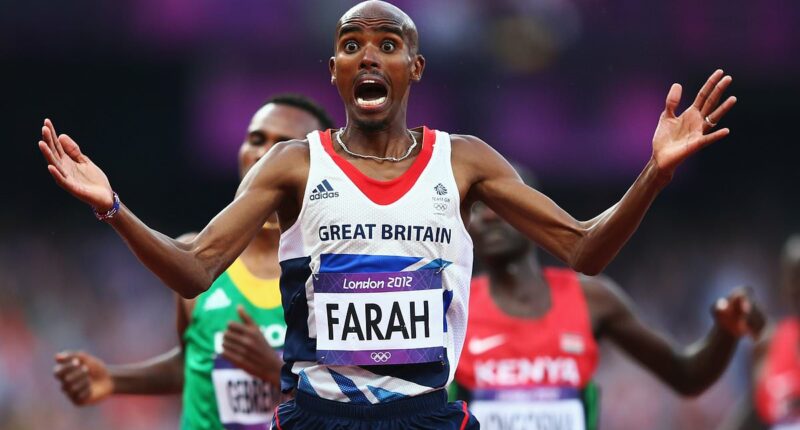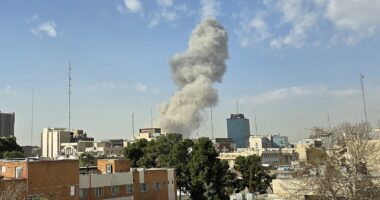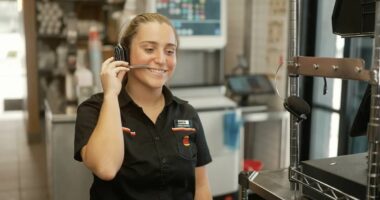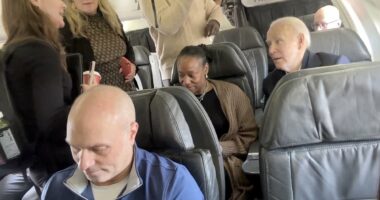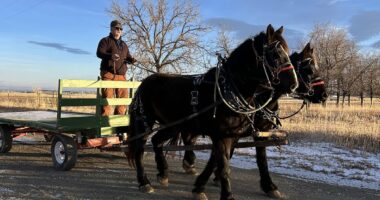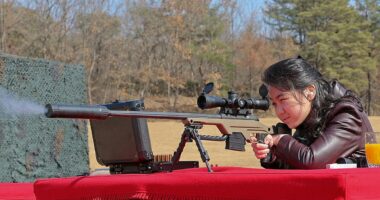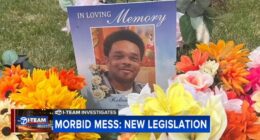Share this @internewscast.com
The excitement of the London 2012 Olympics was electrifying the vibrant Eastleigh area of Nairobi, often referred to as ‘Little Mogadishu’ by its residents.
Amid the lively atmosphere filled with street vendors, ‘matatu’ minibuses, and bustling tuk-tuks, the Somali refugee community of tens of thousands had one name on everyone’s lips.
Mo Farah, a runner who shared their Somali heritage, had escaped the turmoil of the nation’s civil war, and now, defying the odds, he was poised to compete in the Olympic 10,000m final.
That summer, he became a beacon of hope and inspiration for every Somali residing in Eastleigh.
Among those in awe was a 29-year-old refugee named Mohamed Farah, who found a personal connection to the athlete through their shared name.
While the surname Farah was common, Mohamed didn’t dwell on this coincidence. Instead, he found solace in it, a welcome diversion from his daily grind of earning £2 a day packing boxes in Nairobi, far from his parents and the life he once knew.
He had no notion that there were other, more startling coincidences between himself and the runner chasing gold 6,200 miles away in London. No idea that not only had both he and Mo Farah been born in Mogadishu in 1983 but that they also had the very same birthday.
Had smartphones and internet connectivity been as ubiquitous around the world back then, he might have discovered these facts which, as we shall see, had a critical bearing on his life story.

Mohamed Farah, pictured in 1995, had no notion that there were other, more startling coincidences between himself and the runner chasing gold 6,200 miles away in London

Sir Mo Farah at Feltham Community School in London, aged around 11
Sadly, such luxuries were far beyond his means. So on that magical evening of August 4, 2012 – since eternalised in British sporting legend as ‘Super Saturday’ – it was in ignorance of this crucial information that Mohamed and two distant relatives huddled around the ancient 14-inch television they shared in the tiny single bedroom they called home to watch history unfold.
‘Come on Mo, come on Mo! You can do it!’ Mohamed screamed as Farah crossed the line to claim gold – and sent Eastleigh into raptures.
A week later, Mohamed watched his namesake win a second gold in the 5,000m and cement his place in the record book as an Olympic legend.
But the athlete’s newfound fame inevitably resulted in scrutiny of his background. And it would become apparent that the fact Mohamed Farah shared a name, birthplace and birthday with the gold medallist was far from a coincidence.
Rather, it emerged that the long-distance runner had unwittingly assumed Mohamed’s identity when he was a little child and, two decades before the 2012 Olympics, had been flown to Britain in Mohamed’s place using his visa.
It was a dark and long-hidden secret in Mohamed’s family. One that would explain why he remained trapped and alone in the war-torn Horn of Africa, growing up in abject poverty thousands of miles from his parents in Britain.
All while Mo Farah rose to fame and fortune in his adopted country under Mohamed’s name.
Now, following a year-long investigation by the Daily Mail, Mohamed tells his extraordinary story for the first time – both in print and in a three-part Daily Mail podcast series with an accompanying video documentary: The Other Mo Farah.
In the course of our investigation, we reunite Mohamed with his mother in Africa after the agony of 31 years of total separation. And we speak to his father – the man who took in Sir Mo as a child in Britain and also breaks his silence.
Today in the first of a two-part feature, Mohamed and his family detail the sliding doors moment in 1993 that altered the course of sporting history and condemned Mohamed to a life of poverty.
And we explain why the truth was hidden until that iconic night in 2012 changed everything – as Sir Mo Farah himself dramatically intervenes to support Mohamed’s fight to finally come to Britain.
The secret was first told to the world three years ago, when Sir Mo Farah revealed his real name is, in fact, Hussein Abdi Kahin.
The Olympic hero claimed he had been trafficked to Britain as a child and kept for a while as a domestic slave there – before his prowess on the track saw him rise to greatness.
And yet his Bafta-winning documentary, The Real Mo Farah, barely featured Mohamed. Sir Mo told how he was taken to Britain in 1993 on Mohamed’s visa, but was unable to explain how the other boy was left behind.
Today we finally answer that question. But to truly appreciate what happened and why, you must first understand the devastation wrought by the Somali civil war – a bloody conflict that tore countless families apart and forced decent people to make impossible choices.
In the late 1980s, fierce fighting by rebel groups against the ruling military junta broke out in the north of Somalia. By 1991 armed guerillas had overthrown the country’s increasingly brutal dictator Mohamed Siad Barre, who had ruled from the capital Mogadishu for decades.
Within a year of the dictatorship falling, more than a million people had fled over the border. To this day the once idyllic country became a hotbed of extreme violence, poverty and terror.
Mohamed’s mother, Leyla Geedi, 59, recalled her past life in Mogadishu with great fondness, however. ‘It was the most beautiful life in the world [before the war],’ she said. ‘We lived in a big six-bedroom house with a living room and two bathrooms. It was a great life. Somali people used to live well. It was very peaceful.’
But in 1991 the capital descended into bloodshed – and Leyla, a single mother, was forced to flee with her five children, including Mohamed, her middle child.
‘Everyone was running for their lives, people didn’t even take so much as clothes to carry,’ she said.
‘We were all looking for a place to sleep. During the days, that would be on the streets and at night we’d find a tree to take shelter under. Everything went to zero, no food, no nothing.
‘Seeing people die and having to walk over them was horrifying. I’d never seen anything like this before.’
Homeless, penniless and unable to provide, for two years Leyla and her children slept rough on the streets of the Somali capital where the fighting was so ferocious ‘bullets fell from the sky’.
Then, in the summer of 1993, in a state of despair, she decided to take a perilous journey 900 miles north to Djibouti.
She went there because she was hoping to locate Muktar Farah – her ex-husband and Mohamed’s father – who, thanks to his colourful love life, was unwittingly to alter British Olympic destiny.
Muktar, now 64, had left Leyla when Mohamed was six months old. He moved to Djibouti and married a woman called Nimco Ateye – the second of four wives – with whom he had two sons: Wahib and Ahmed.
Leyla meanwhile hoped Muktar could give refuge to her and her young family in Djibouti. What she didn’t know was that he had moved to Britain after being granted asylum there.
Under UK immigration law, that meant his current partner and children could all join him as part of a ‘family reunion’ scheme.
Muktar had sent four visas to his new wife Nimco in Djibouti. One for her, two for their sons Wahib and Ahmed, and another one for Mohamed.

Mohamed is reunited with his mother, Leyla – the first time they have seen each other since he was a child

Nimco Ateye married Mohamed’s father, who had left his wife and six-month-old son to go to Djibouti, and had two sons with him
When Leyla arrived in Djibouti, a relative of Muktar’s told her the good news about the visas.
While sending Mohamed to Britain would be personally heartbreaking for Leyla, it would not only give her son a golden ticket to a better life but also dramatically improve her family’s chance of survival with one less mouth to feed.
Leyla was told to meet Nimco, now 63, at an agreed point in Djibouti City.
‘I was told to meet by the big markets,’ Leyla said, but Nimco didn’t show. Leyla says she also attempted to reach her in Nimco’s home neighbourhood – but again, no luck.
‘She refused to meet us on six attempts,’ Leyla said.
With no money, no documents, and no sign of the visa, Leyla eventually took to the road again after her sister suggested she join her in Nairobi, 1,400 miles to the south.
‘Djibouti was not a place where you could live – housing was expensive, the kids were crying over the heat and I was worried we would die there,’ Leyla said.
Sharing lifts with others, they decided to make the arduous journey to the Kenyan capital where life was cheaper – believing Mohamed’s visa was waiting to be collected another time.
Leyla didn’t know it at the time, but very near her in Djibouti, perhaps just a few hundred metres away at times, had been a little boy called Hussein Abdi Kahin – the future Sir Mo Farah.
As he explains in his documentary, Sir Mo was not born in Mogadishu but in a remote village called Iranka Deriyanka in the northern desert of Somaliland – a semi-autonomous region of Somalia.
When Sir Mo was only about four years old, his father, Abdi, was killed by a stray mortar round.
Fearing for her children’s safety after the tragedy, Sir Mo’s mother Aisha made the impossible decision to send him and his twin brother Hassan to live with his uncle and great aunt in Djibouti – away from the fighting.
Their house just happened to be next door to Nimco Ateye, who in 1993 came into possession of those four UK visas.
What she did next is pivotal. Nimco gave the visa to the boy next door instead of Mohamed. She has declined all interviews but sources close to her have insisted this was because Leyla refused to hand over Mohamed and Nimco, panicking that she would be turned away from the UK if she didn’t ensure all four visas were used, chose her neighbour’s child for the final one.
It is not an impossible scenario, of course, but given Leyla’s desperate situation at the time and that of her children, as well as the extraordinary opportunity a UK visa offered Mohamed in comparison, it seems unlikely.
Meanwhile, our investigation has also unearthed a compelling new detail.
We can reveal that Nimco was actually very close to her neighbours, Sir Mo’s uncle and great auntie. In fact they, and by connection Sir Mo, were all members of the same tribe in Somalia.
The tribal system underpins Somali society. If you are from the same clan – meaning you share common ancestors – there is a mutual obligation to support one another in times of need.
By giving her neighbour that visa, Nimco would have been seen by her tribe as bestowing the greatest gift imaginable in those hard times. So, did she do this in the belief that her new husband’s ex-wife was stuck in Mogadishu?
If so, Leyla’s sudden appearance in Djibouti risked scuppering her plans and Nimco would have had every motivation to avoid meeting her.
Whatever the case, for Sir Mo, what followed was unimaginably traumatic. He told in the documentary how, in the dead of night, he was taken away from his twin brother by Nimco – a woman he did not know. And how he was loaded onto a train for Ethiopia, told to take the name Mohamed Farah, then put on a plane to Heathrow. While Muktar paid for Nimco’s and the two children’s flight it is not known how she found the extra money for Mohamed’s ticket.
In London, Muktar had known nothing of these goings on – he simply believed that Leyla was still in Mogadishu with his son.
He told us he could not have been clearer with Nimco, telling her that he would travel to Africa himself to collect Mohamed once she was safely in Britain with their two children.
‘I sent a letter, I sent a cassette and I telephoned – I said please, don’t touch that visa,’ Muktar, a retired delivery driver, told us from his home in Manchester.
‘I warned her many times, you take our children and when you come here I will go there [to Somalia] and I will take my son from there.’
It was on September 1, 1993 that Muktar headed to Heathrow arrivals, excited to see his wife Nimco and their children Wahib and Ahmed.
Something was wrong, though. He was expecting two children – but there were three.
‘I was shocked – and everything collapsed,’ he said. ‘Who is this boy?’ he demanded of his new wife. She couldn’t answer him.
‘The nightmare starts,’ Muktar told the Mail. ‘I get mad. I’m shouting, shouting. From that day, I never stopped asking her – where is my son?’
Nimco confessed that the boy had used Mohamed’s visa. After three days’ thinking about it, Muktar said he was going to the Home Office to demand the young Sir Mo be sent back to ensure Mohamed got his visa.
‘But then Nimco told me, this boy doesn’t have any family,’ Muktar said.
‘It changed everything. I told myself: if I take this boy back to Somalia he has no-one,’ he recalled. ‘So I changed my mind. I accepted him as a son.’
It was this decision, he said, that sealed the fate of Sir Mo and his son Mohamed.

Sir Mo Farah with his wife Tania and three of their children
Overcome by emotion, Muktar added: ‘I don’t know what I call myself. Ever since that night, every step I take, every step, I’m telling myself: “You’re guilty, you’re guilty, you’re guilty.”
‘Because I was guilty. I swapped my son for someone else.’
Unsurprisingly, he separated from Nimco immediately and they later divorced.
For the young Sir Mo, it meant he was left largely alone with Nimco, and he movingly described in the documentary how tough those years were separated from his family in an alien land.
He even compared his treatment to human trafficking, not least because he said that after arriving in Britain he was then forced to cook and clean for Nimco’s two children.
In time, after he had grown more confident thanks to his athletics success, he told his PE teacher. Social services were called, and he was moved to live with Muktar’s sister, Kinsi, 70, where life was easier.
With the continuing support of his PE teacher, Sir Mo finally became a UK citizen in 2000 which allowed him to compete for Britain in athletics.
As for Nimco, she was investigated for human trafficking after Sir Mo’s documentary, but the probe was dropped and no charges were brought.
All this time, Leyla was in Nairobi trying to help her family survive. She had no idea her son’s visa had been taken by the future Sir Mo.
She and her five children, including Mohamed, lived shoulder-to-shoulder with another relative in a cramped, one-room flat in Eastleigh no more than three metres wide with only a small, barred window allowing in slivers of light.
When the Daily Mail visited the flat, the first thing that hit us was the stench outside from the filthy, solitary toilet that dozens of families must share.
The building is damp as clothes drip dry on the staircase above, while small children collect drinking water for their households each day from the single tap that serves them all on the ground floor.
‘I can’t describe how difficult this was,’ Leyla told us, her eyes filling with tears. ‘It was a terrible life, the kids would constantly cry. It was such an ugly life.’
‘I never imagined we would be living like this,’ Mohamed added, now aged 42, as he comforted his mother.
With no paperwork to prove who they were after fleeing from Somalia, any trip out onto the streets risked an arrest and a shake down from the police who would take months of hard-earned money as bribes before releasing them.
After two years, Leyla moved her children in with her sister, Amina, in a slightly nicer two-room apartment nearby. Then, she made an agonising decision.
By 1995, war and famine had decimated Somalia. There was no hope of going home to Mogadishu. But life in Kenya was unbearable, too.
And in the absence of communication from the UK, Leyla believed there would be a visa there waiting for Mohamed.
She also knew of Somalis who had successfully claimed asylum in Britain and then brought their family over as dependents – just as Muktar had. And since, at this point, all five of her children were under 18 and she was unable to work, pay rent or provide for them in Kenya, she set off alone on an arduous journey to Britain, deciding this was her one shot at breaking her family out of destitution.
Some may question how a mother could make such a decision. But one must truly contemplate the despair Leyla faced. It was too dangerous, and too costly, for five young children to make such a journey so for better or worse, she made her choice.
In Eastleigh, we revisited the spot outside Leyla’s sister’s apartment where they said goodbye on that awful day 31 years ago.
‘I was so worried about my kids because I left them in a place filled with starvation,’ Leyla told us, breaking down.
‘I wanted to make a better life for my children, I was afraid that I would die without being able to provide for my children or for my older sister.’
She did not know it then, but this was to be the last time she would see Mohamed for more than three decades.
‘I was crying,’ Mohamed recalled, wrapping his arms around his mother and planting a kiss on her forehead. ‘My mum leaving me, it was very painful.
‘I said, “Mum, are you leaving me?” And she told me, “I will come back for you, Mohamed. Don’t worry. I’ll come back home.”
‘That was the last word I said to my mum – are you leaving here?’
Leyla travelled through Pakistan to Bangkok and from there took a flight to Britain. But on arrival, she made a horrifying discovery.
‘I only found out as I arrived in England that Mohamed’s name had been used,’ said Leyla, who immediately applied for asylum. ‘I shouted at his father to say how can this happen? Your child is wasting away in Africa, how can you give away his documents?
‘He said it wasn’t him and his ex-wife tricked him. But I got angry.
‘I was constantly crying, night and day. I couldn’t do anything, it affected me so much.’
Any attempt to bring her children over as dependents was now hugely complicated – and for Mohamed in particular, this all but ensured he would never be able to join her.
Leyla had to wait years as her asylum application was processed – years in which she could do nothing to try to bring her children to Britain.
All the while she could only communicate with them by posting cassettes on which she recorded messages saying she loved them.
She could not bring herself to tell Mohamed what had befallen him, however. ‘All I knew was that they were alive, nothing else,’ she said of those years.
Mohamed missed his mother dearly, but his Kenyan neighbours had in the meantime given him a new passion – cricket.
While, unknown to him, the boy living under his identity in Britain was making a name for himself on the track, Mohamed himself was opening the bowling for Nairobi’s competitive Sir Ali Muslim Cricket Club.
He was so talented that Kenya came knocking. However, unlike the future Sir Mo who was embraced by England, Mohamed was turned away from national trials when they discovered he was Somali.
It was in 2000 that Sir Mo was given UK citizenship, the very year Leyla was also granted asylum after a five-year wait. Finally she could get a job to start earning and apply to bring her children across.
But the wait had taken too long. In the intervening years, her two eldest had turned 18 and so were no longer dependent and now trapped in Africa. They decided to try to make a life for themselves in neighbouring Ethiopia.
Mohamed was only 17, but even though he was a dependent, because his visa had been used he was ineligible. To soften the blow as his two younger siblings left for Britain he was told by his mother that he was also too old.
Throughout it all, Mohammed still had no idea that his visa had been taken, nor of the promising young athlete who had been given it.
At this stage Sir Mo was making his mark on the world stage and in 2006 won silver in the 5,000m at the European Championships in Gothenburg to become Britain’s second-fastest runner over the distance.
Back in Nairobi, Mohamed was in the midst of one of the darkest periods of his life.
He was alone in Eastleigh, with only his Aunt Amina to comfort him.
Then, on a winter’s day in 2005 she suddenly fell ill and became unresponsive. Mohamed rushed her to hospital, but there was nothing the doctors could do.
She had acute kidney failure. Three days later she was dead, buried that same afternoon.
‘It felt like I lost a part of me,’ Mohamed tells us through tears, standing in the apartment block where she fell ill.
‘I can’t tell you how painful it was. She was my only family. My life was so tough, I grew up with such a hard life that I can’t talk about.’
Five months after her death, Mohamed was evicted – forced to sell all his belongings to cover the rent he’d been unable to pay. He became homeless. He took us to the grassy verge where he would sleep at night.
‘Some days I would sleep with some families I knew and other days I would hide and sneak to the side of this building to sleep on the grass,’ he said, his eyes red with tears. ‘I would leave before people saw me.’
Mohamed hid what had happened from his mother, not wanting to worry her as she scraped by on a zero-hours contract on the minimum wage as a carer in London.
But after six months, word reached her. She was broken – both by the death of her sister, and the circumstances of her son.
‘I was in hospital for nine nights, sick with grief and thoughts racing about who would look after Mohamed,’ she said.
‘We needed to find him a place to live but even then I was scared he would be living miserably.
‘I was so worried for him and I could never speak to him on the phone properly.’
She sent what little money she could to him and slowly he got back on his feet earning £2 a day packing boxes, saving up enough money for lodgings from time to time.
Meanwhile, still unknown to him, Sir Mo’s rise continued and in 2010 he won double gold at the European Championships – the first British man to do so.
After a few years, Leyla connected Mohamed with two distant relatives who took him into their single-room apartment in Eastleigh.
It was here, in 2012, that he watched that 10,000m race.
‘It was just me and another aunt watching him,’ Mohamed said. ‘Jumping up and down shouting “Come on Mo! Come on Mo! You can do it!”
‘It was such a good feeling watching him as a Somali man winning Olympic gold.’
A week later he watched him win the 5,000m.
‘I don’t think there was a Somali in Kenya who didn’t watch that race,’ Mohamed joked. ‘People were cheering him everywhere.’
The historic Olympic double catapulted Sir Mo to fame – and with it came information about his backstory.

Sir Mo Farah wins gold for Great Britain at the men’s 5,000-metre race in the 2012 London Olympics
In the Somali community, tongues immediately started wagging.
Around a year after that victory, some Somalis from London visited Mohamed during Ramadan.
They sat across from each other, sharing a plate of traditional Somali rice with goat meat after a long day of fasting. Then came a question that stopped Mohamed in his tracks.
‘They asked me, “Did you speak to Mo Farah,”’ he recalled. ‘I said, “No, what are you talking about?” Why would I speak to him?
‘Then he told me. He said, “You know he’s using your name? Your dad took him in, in London.”’
Mohamed was speechless. ‘I couldn’t believe it,’ he said.
Gripping his head, struggling to contain his emotions even now, he added: ‘It hurt.’
Surely they were mistaken, he thought. How could it be? He scrimped together enough money to place a call to the UK, to his father, who would surely put this ridiculous rumour to bed.
But Muktar’s response left him cold. ‘I’m so sorry,’ he said. ‘It’s true.’
All episodes of Deep Dive: The Other Mo Farah, a year-long investigation charting Mohamed’s extraordinary story, are available now wherever you get your podcasts.
